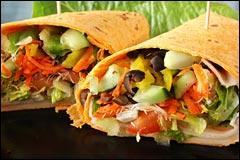The succulent wares of Whole Foods’ enormous flagship store in Austin are always tempting, but especially so during a harried lunch hour. Everything in the vast prepared-food section looks irresistible. The salad bar features a mountain of fresh, organic toppings. Pricing is mostly by weight, so one can escape with a cup of splendid, coconutty split-pea soup and a small salad for less than $6. For those who have the time, dozens of tables are available for sit-down dining.

A different kind of drive-thru.
Photos: iStockphoto
As the $14 billion organic food industry gathers steam, the concept of healthy fast food is spreading. While Whole Foods is in the vanguard, others are catching up. More and more restaurants are tapping into Americans’ desire to eat quickly, and realizing that fast food can involve much healthier stuff than a Whopper and fries.
Austin, never shy about its green tendencies, is also home to drive-through salad bars and a pair of tasty restaurants called Mr. Natural, which offer wholesome Mexican food and baked goods. In other cities, organic pizza and burgers — which are relatively easy to make — are becoming a staple.
Some big chains are scrambling to get a share of this niche. Chipotle, a fast-expanding burrito company that went public earlier this year, boasts that about 20 percent of its beans are organic — and “next year I imagine that percentage will be higher,” says Steve Ells, the chief executive. The pork, too, is sustainably raised and hormone-free. Best of all, customers can watch their food being prepared — the onions and peppers being chopped up, and the chicken readied on an open grill. In fact, Ells bristles at being lumped in with other, more traditional fast food — despite the fact that much of his chain’s success is due to support from McDonald’s. “Just because it’s fast doesn’t mean it has to be a typical fast-food experience,” he argues.
That philosophy is shared by plenty of start-ups. O’Naturals, a New England chain that currently has two restaurants each in Maine and Massachusetts, notes that one-third of its food is organic. There are organic roast-beef sandwiches, organic hummus, and organic greens for salads, not to mention bottled smoothies to wash everything down. Gary Hirshberg, who cofounded Stonyfield Yogurt and dreamed up O’Naturals while shuttling his children between soccer games, is now busy extending the franchise. On the West Coast, the Organic To Go chain touts everything from ham and cheese to veggie salads, with 70 percent of its ingredients typically being organic.
Several of Organic To Go’s dining spots are on college campuses, many of which are offering more local and healthy fare in response to student demand. At the University of Colorado at Boulder, the recently opened Piazanos “grab n’ go” café peddles natural and organic food. Vanderbilt University just opened a 900-square-foot convenience store called Nectar that does organic. The Otter Bay Café at California State University at Monterey Bay offers organic salads and fruits.
Then there are ballparks. Some bold entrepreneurs, Dakota Beef Company and Delaware North Companies Sportservice, have begun selling organic bratwurst and hot dogs at baseball stadiums in San Diego, Cleveland, and even Detroit, which is currently cohosting the World Series. But executives at both companies admit to challenges.
For one thing, there’s fan awareness. “You’ve got to really ask yourself, when sitting in a stadium drinking beer, are you going to care whether your hot dog is organic or not?” says Scott Lively of Dakota Beef. And Rolf Baumann, executive chef for Delaware North, says that often ballparks even avoid the organic label “because an organic hot dog doesn’t sound too appetizing.”

An excellent choice.
Despite the disinterest from sports fans, those fronting the fast-food wave say organic diners are not just yoga types. At O’Naturals, there are seniors wanting to stay fit as well as health-conscious mothers and professionals in a hurry. Chipotle caters to businesspeople at the lunch hour, as does Whole Foods. And this is no coastal trend: Jason Brown, head of Organic To Go, anticipates expanding into at least one Midwestern city by the year’s end, and Chipotle is based in Denver.
So the outlook looks good. Still, challenges abound. First, there are relatively few organic growers, and supply is seasonal. Organic food can be hard to certify, and certification itself is a notoriously hot topic. Some in the restaurant industry are worried that Wal-Mart’s recent entry into the organic market will disrupt supply or reduce the quality of available ingredients. Also, because organic food lacks artificial preservatives, finding the right recipe can be a challenge. Lively says Dakota Beef spent a year coming up with a tasty-enough hot dog, with the use of organic garlic and “a good organic beet juice to make it a little more red.” The company says its hot dogs have a 41-day shelf life, and are made only after a customer order is received.
Besides tinkering with recipes, the process can also be slowed by high prices. At O’Naturals, the Wrangler sandwich — organic roast beef, Swiss cheese, rosemary onions, organic lettuce, and tomato on flatbread — costs twice as much as a Big Mac. But as farms expand their organic capacity and the supply chain gets more reliable, high prices may come down.
Perhaps the definitive word comes from the conventional fast-food chains. McDonald’s has not only begun swapping milk and fruit for the soda and fries in its Happy Meals, it also now offers Newman’s Own organic coffee to customers in New England and New York. With pressure on the burger chains to cut calories and add healthier options to their menus — and boost their bottom lines with premium products — it could be only a matter of time before the other heavy hitters start offering organic dishes of their own.

